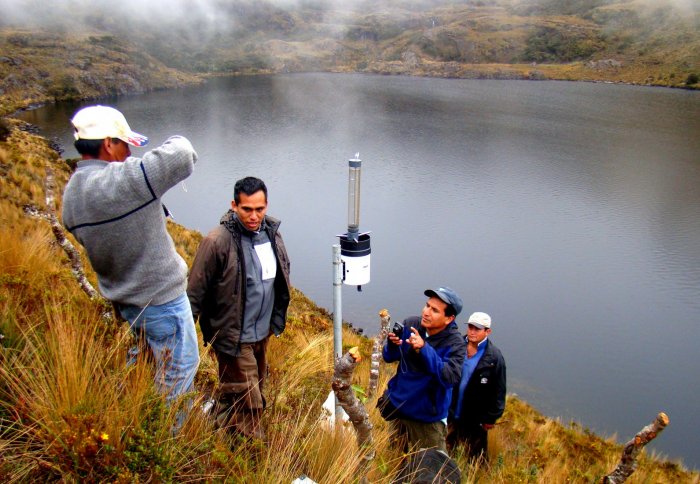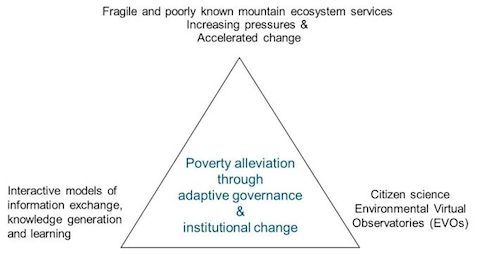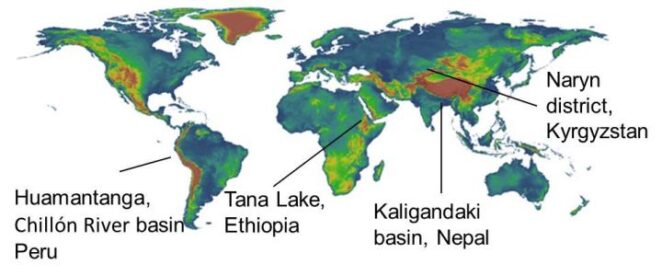MOUNTAIN-EVO: Adaptive governance of mountain ecosystem services for poverty alleviation enabled by environmental virtual observatories

The world’s mountains host some of the most complex, dynamic and diverse ecosystems. But these environments are under severe threat, ranging from local deforestation and soil degradation to global climate change.
Global climate models project stronger warming at high elevations, with potentially disastrous consequences for its ecosystems services (ESS). For instance, melting glaciers alone will affect the water supply of millions people, while soil degradation and erosion put local agricultural practices in danger, but also cause water quality degradation and siltation of downstream reservoirs.
At the same time, the complexity of mountains also makes predicting the direction of future changes in ESS extremely difficult. For instance, global climate models do not capture local weather patterns and traditional models of natural and physical processes may not represent extreme and region specific behaviour. This leads to large uncertainties in future predictions about mountain ESS.
Under such conditions, the value of day-to-day information about how local ecosystems behave increases sharply. Continuous monitoring of crucial ecosystem processes becomes paramount. It allows local decision-makers to flexibly change course in response to unexpected behaviour and large uncertainties.
However, because of their remote location and difficult access, monitoring ESS in mountain regions tends the lag behind the rest of the world. The same remoteness and lack of access are also responsible for the propensity of mountain regions to host poor and underdeveloped communities compared to the surrounding lowlands. Lastly, mountain regions tend to be more prone to conflict, which further inhibits human development.
This project will analyse how monitoring and knowledge generation of ESS in mountain regions can be improved, and used to support a process of adaptive, polycentric governance focused on poverty alleviation. For this, we will blend cutting-edge concepts of adaptive governance with technological breakthroughs.
The availability of cheap and robust sensors and communication technologies provides great opportunities for citizen science: bottom-up, user-oriented data collection focused on local concerns. We will take citizen science to the next level, by integrating it within a broader framework of participatory data processing, knowledge generation and sharing.
We do this by adopting the concept of Environmental Virtual Observatories (EVOs) and leverage it for poverty alleviation. We see the potential of EVOs to be decentralised and open technology platforms for knowledge generation and exchange that enable participation of marginalised and vulnerable communities bypassed by traditional mechanisms.

Mountain EVO: Main Pillars of Influence
Therefore, in this project we analyse how EVOs can be used to generate knowledge and to alleviate poverty in 4 remote and poor mountain regions: the Ethiopian highlands around Lake Tana, the Central Tien Shan Mountains of Kyrgyzstan, the Kaligandaki watershed in Northern Nepal, and the Andes of central Peru.

Mountain EVO: Case Study Regions
In each location, we collect evidence on the local decision-making processes on ESS and their local socio-economic context. At the same time, we develop a technology toolset to enable EVO development for each case. Subsequently, the results of both processes are brought together to implement tailored EVOs to support citizen science and local knowledge generation.
We create novel ways to interact with EVOs beyond the traditional Internet, focussing on leaflets in the national language, community radio and mobile phone applications. We evaluate how improved access to local observations fosters cross-scale linkages between the poor and external actors, as well as linkages between communities and marginal groups.
Lastly, we investigate how this can lead to better community awareness of environmental change and identification of pathways for poverty alleviation.
This project is largely a follow-up from an earlier ESPA Project Framework grant awarded to Imperial College London and CONDESAN (NE/I004017/1). The website of that earlier project can still be found here.
Recent publications on the topics of adaptive governance, citizen science and EVOs
The participation of the general public in the research design, data collection and interpretation process together with scientists is often referred to as citizen science. While citizen science itself has existed since the start of scientific practice, developments in sensing technology, data processing and visualization, and communication of ideas and results, are creating a wide range of new opportunities for public participation in scientific research.
Click here to access publication: Advancing adaptive governance of social-ecological systems through theoretical multiplicity
Click here to access publication: Citizen science in hydrology and water resources: opportunities for knowledge generation, ecosystem service management, and sustainable development
Click here to access publication: Environmental Virtual Observatories (EVOs): prospects for knowledge co-creation and resilience in the Information Age
Development pathways in mountain regions
A development pathways lens helps our project develop a more nuanced picture of poorer and marginalised people in mountain regions. Most importantly it helps reappraise mountain people as active citizens with different capacities to react and adjust to changing development opportunities and constraints, and to choose various lifestyles in line with their values and aspirations.
Check out the recent Prezi talk of Dr Timothy Karpouzoglou on development pathways in mountain regions, from the conference “Development 2.0 or ‘Business as usual?’ Private Sector, Institutions and Development” at the Institute of Development Policy and Management (IOB), University of Antwerp
Mountain EVO rationale and main partners
This project blends cutting-edge concepts of adaptive governance with technological breakthroughs in citizen science to break the knowledge trap cycle in mountains. Click here to read about our partners.
(0) Comments
There is no content